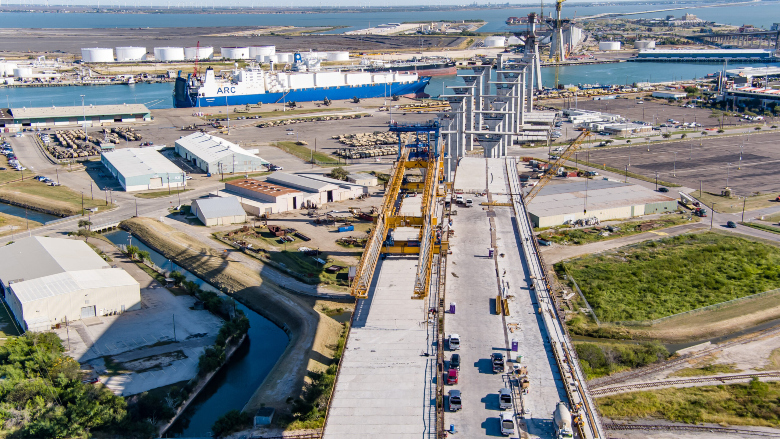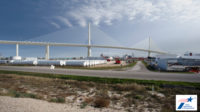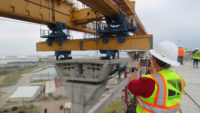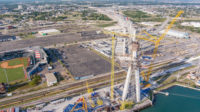Bridges
Corpus Christi New Harbor Bridge Main Span Work Cleared to Resume

Work continued on approaches to the new Corpus Christi Harbor Bridge during a halt of work on the main span. TxDOT says main span work may now continue.
Photo courtesy of Harbor Bridge Project
Work on the main span of the new Harbor Bridge in Corpus Christi, Texas, resumed Dec. 15 after a nearly four-month suspension over design safety concerns. Texas Dept. of Transportation officials now anticipate completing the $930-million cable-stayed bridge within three years.
Crews from joint venture contractor Flatiron/Dragados LLC now can lift delta frames into place and continue construction of the main span towers, the agency announced.
Work had continued on bridge approaches following the TxDOT-ordered shutdown of main span construction in July, this resumption “represents a huge step forward for the project,” Valente Olivarez Jr., agency Corpus Christi district engineer, said in a statement.
TxDOT had ordered the shutdown over safety concerns primarily related to five issues with the bridge design. In November, Olivarez said state officials and the contractor had resolved the first design issue, related to delta frame connections. He then reported during a Corpus Christi Metropolitan Transportation Organization Transportation Policy Committee meeting Dec. 1 that they were “pretty close” to a resolution on the next three design issues, which relate to the tower foundations and construction sequencing. Resolving those would allow work on the towers to proceed, he said.
Rickey Dailey, an agency spokesperson, said via email that progress is continuing on the remaining design items.
In a statement, Olivarez said the resumption in erecting elements of the bridge superstructure indicates the contractor is adhering to a work schedule to complete the project in 2025. Officials had originally aimed to finish it in 2021.
The 1,661-ft-long bridge is intended to replace the existing Harbor Bridge over the Corpus Christi Ship Channel. The project also includes reconstruction of an interchange and connecting roads, plus demolition of the current bridge.
TxDOT has previously raised concerns about the bridge design. In 2020, it removed the original engineer-of-record, FIGG Bridge Engineers, following a National Transportation Safety Board review of a pedestrian bridge designed by the firm that collapsed in Miami. Agency officials later appointed a team of Arup and CFC as the new engineer-of-record.
They then hired International Bridge Technologies, a subsidiary of French transportation engineering firm SYSTRA, to conduct an independent review of the design. The firm's report raised concerns that prompted TxDOT to order the temporary suspension of main span work.
The agency issued a notice of developer default in August, threatening to replace Flatiron/Dragados LLC with another contractor if it would not agree to resolve design issues. By October, the contractor and state had reached an agreement setting the framework to address the concerns.




